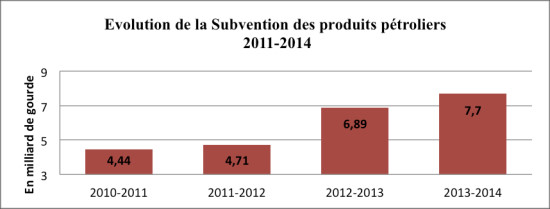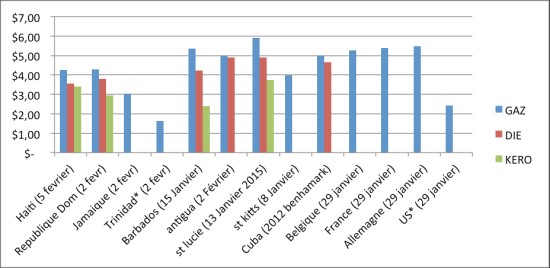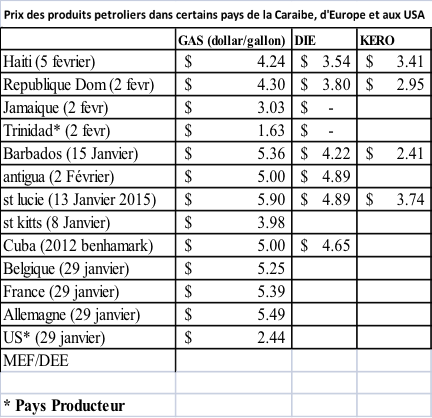|
||||||||||||||||||
|
|
Haiti - Economy : Everything you need to know about fuel prices 07/02/2015 11:00:38
Up context of international oil prices and subsidy from March 2011 to October 2014 : About a year after the 2010 earthquake, because of the context of rising oil prices globally combined with the precarious situation of food insecurity in Haiti and post-earthquake shock, the Haitian government has frozen since March 2011, prices at the pump to protect the most disadvantaged; The implication of this measure has resulted in a subsidy of petroleum products, shortfalls of billions of gourdes and reimbursements to importers to keep prices at the pump. From 2010 to the end of fiscal 2014, the fiscal losses on petroleum revenues increased from 0.5% of Gross Domestic Product (GDP) to 2% of GDP, while the budget deficit is in the order of 5% of GDP; These losses totaled nearly $ 8 billion gourdes in 2014. Of the three years they are valued at about 19 billion, more than the investment budgets of the ministries of Education, Social Affairs and Health together . Studies conducted by the MEF and the World Bank have shown negative effects of the subsidy on poverty, inequality and public policies in education and health;  Recent situation of decline in international cost and price changes at the pump : At the end of the 2013-2014 fiscal year, the Haitian government was committed to eliminate the subsidy on petroleum products by the end of the 2014-2015 fiscal year; A timetable has been established in this sense : It was expected to proceed by four (4) price increases in 2015 to be able to fully eliminate the subsidy https://www.haitilibre.com/en/news-12238-haiti-notice-painful-increases-in-fuel-prices.html This allowed to build upon forecasts of petroleum revenues of around 7.8 billion gourdes for the fiscal year; Thus, a first increase in prices took place in October 2014, a gallon of gasoline has increased from 200 to 215 gourdes, diesel gallon increased from 162 to 177 gourdes per gallon and diesel increased from 161 to 171 gourdes; However, the context of the fall in prices of petroleum products on the international market has been at the favor of the automatic elimination of subsidies on petroleum products and allowed the redesign of the phasing out of the subsidy program envisaged for the year. This favorable situation allowed to record petroleum revenues of around 2.2 billion gourdes in the first four months of fiscal year 2014 to 2015 and to anticipate that the budget estimates of petroleum revenues would be reached under the price assumption slightly revised upward and revised upward and consider lower prices at the pump. But, faced with the decline in Petrocaribe Fund's resources caused by the oil price on the international market, a sharp fall in prices at the pump may be catastrophic for the balance of public finances and cause a deterioration of conditions macroeconomic detrimental to the stability and the continuation of certain policies aimed at improving household living conditions; In this context, the Government conduct negotiations with drivers' unions, who conducted a decision to lower prices of petroleum products https://www.haitilibre.com/en/news-13095-haiti-flash-fuel-price-decrease-the-government-made-an-extra-effort.html Gazoline 20 Gourdes Diesel 20 Gourdes Kerosene 15 Gourdes These adjustments were accompanied by the commitment of the state to reactivate as soon as the automatic adjustment mechanism. Budgetary impact of new adjustment and comparison with the Caribbean : The new adjustment should allow oil revenue of around 8 billion gourdes for the year, if the adjustment mechanism is activated and if an increase does not exceed 5% of the CIF (Cost, Insurance and Freight) in gourdes, which is within the limits of budget estimates for 2014-15. But the combined drop in Petrocaribe resources leads to a revision of budget predictions credit of the exercise on the Petrocaribe funding to nearly half. Compared to other Caribbean countries, the price in Haiti is very close to the Dominican Republic, with a difference of nearly 10 cents less than at Cuba. It is clearly lower than in most European countries such as France, Belgium and Norway where gasoline is more expensive.  Prices of petroleum products in some countries of the Caribbean, Europe and the USA in USD :  United States, Trinidad and Tobago and France are oil producers Adjustment mechanism in force : Changes in prices at the pump are made through an adjustment mechanism known as "automatic trigger" which dates from March 1996 and works as follows: The Haitian government, through the Ministry of Economy and Finance (MEF) and the Ministry of Trade and Industry (MCI), varies the price of petroleum products when the combined effect of international oil prices and taxes and duties levied on these products involves a change in the price pump beyond ± 5%. Otherwise, prices remain unchanged; The calculation that allows to see if the pump price should change or not is made at each new arrrival of petroleum products since Haiti is not a producer; The automatic trigger mechanism in the range of ± 5% variation is justified to avoid there are too frequent changes in prices at the pump; For cons, the main drawback of the automatic trigger mechanism remains that price changes are likely to be unfavorable, for the Haitian consumers when prices are rising, either for the State when prices are falling. This involves the often difficult trade-offs. MEF economic measures : The Ministry of Economy and Finances proposes to adopt a set of measures to achieve savings and redeploy credits collected to finance priority projects of the Government. Among the measures proposed to the Government: the ban on purchase of new vehicles, rental cars by state organs, reducing the number of trips abroad including Per-diem, fee reduction related to communication (recharge cards, buy phones), the restriction in terms of allocation of gas coupons, rational use of office equipment and bulk purchasing of supplies and equipment. Restrictive provisions will also be taken at diplomatic missions abroad as part of the reduction in public spending. Furthermore, the Government intends to establish a guarantee fund for production companies including small and medium enterprises and also encourage the latter to settle in the regions. The Government also intends to work with the transport unions to modernize the sector through the establishment of a guarantee fund. HL/ HaitiLibre
|
|
|
Why HaitiLibre ? |
Contact us |
Français
Copyright © 2010 - 2024 Haitilibre.com |



